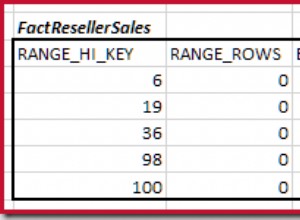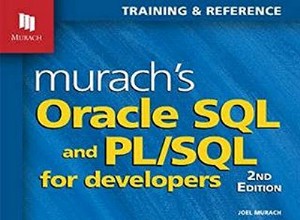Versuchen Sie es mit KEEP DENSE_RANK
Datenquelle:
CREATE TABLE person
(person_id int primary key, firstname varchar2(4), lastname varchar2(9))
/
INSERT ALL
INTO person (person_id, firstname, lastname)
VALUES (1, 'john', 'lennon')
INTO person (person_id, firstname, lastname)
VALUES (2, 'paul', 'mccartney')
SELECT * FROM dual;
CREATE TABLE address
(person_id int, address_id int primary key, city varchar2(8))
/
INSERT ALL
INTO address (person_id, address_id, city)
VALUES (1, 1, 'new york')
INTO address (person_id, address_id, city)
VALUES (1, 2, 'england')
INTO address (person_id, address_id, city)
VALUES (1, 3, 'japan')
INTO address (person_id, address_id, city)
VALUES (2, 4, 'london')
SELECT * FROM dual;
Abfrage:
select
p.person_id, p.firstname, p.lastname,
x.recent_city
from person p
left join (
select person_id,
min(city) -- can change this to max(city). will work regardless of min/max
-- important you do this to get the recent: keep(dense_rank last)
keep(dense_rank last order by address_id)
as recent_city
from address
group by person_id
) x on x.person_id = p.person_id
Live-Test:https://www.sqlfiddle.com/#!4/7b1c9/ 2
Nicht alle Datenbanken haben eine ähnliche Funktionalität wie die Fensterfunktion KEEP DENSE_RANK von Oracle, Sie können stattdessen die einfache Fensterfunktion verwenden:
select
p.person_id, p.firstname, p.lastname,
x.recent_city, x.pick_one_only
from person p
left join (
select
person_id,
row_number() over(partition by person_id order by address_id desc) as pick_one_only,
city as recent_city
from address
) x on x.person_id = p.person_id and x.pick_one_only = 1
Live-Test:https://www.sqlfiddle.com/#!4/7b1c9/ 48
Oder verwenden Sie Tupeltests, die auf Datenbanken funktionieren sollen, die keine Windowing-Funktion unterstützen:
select
p.person_id, p.firstname, p.lastname,
x.recent_city
from person p
left join (
select
person_id,city as recent_city
from address
where (person_id,address_id) in
(select person_id, max(address_id)
from address
group by person_id)
) x on x.person_id = p.person_id
Live-Test:https://www.sqlfiddle.com/#!4/7b1c9/ 21
Nicht alle Datenbanken unterstützen jedoch das Testen von Tupeln wie im vorherigen Code. Sie können stattdessen JOIN verwenden:
select
p.person_id, p.firstname, p.lastname,
x.recent_city
from person p
left join (
select
address.person_id,address.city as recent_city
from address
join
(
select person_id, max(address_id) as recent_id
from address
group by person_id
) r
ON address.person_id = r.person_id
AND address.address_id = r.recent_id
) x on x.person_id = p.person_id
Live-Test:https://www.sqlfiddle.com/#!4/7b1c9/ 24




